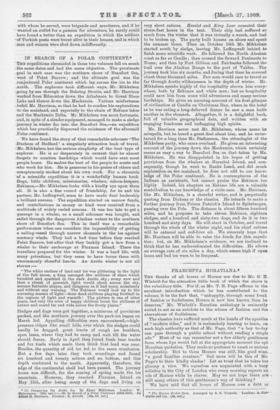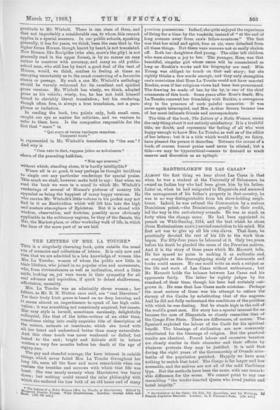PRAEOEPTA HORATIANA.* THE thanks of all lovers of Horace are
due to Mr. S. E. . Winbolt for the attractive little book of Which the above is the subsidiary title. For if, as Mr. T. E. Page affirms in the - excellent introduction which he has contributed to the . volume, it be the fact that, "unhappily, through some freak of fashion or foolishness, Horace is now less known than he • deserves," Mr. Winbolt's Horatian anthology is eminently suited to act as an antidote to the whims of fashion and the aberrations of foolishness.
The classics have suffered much at the hands of the apostles .• of "modern sides," and it is melancholy hearing to learn, on • such high authority as that of Mr. Page, that "a boy to-day - can pass through a public school without reading a single • ode." Most of us can remember not a few elderly gentlemen • from whose lips would, fall at the appropriate moment the apt • Horatian quotation. They made no pretence to exact or serious scholarship. But to them Horace was .still, like good wine, .. "a good familiar creature." Sad news will be this of Mr. Page's to their kindly shades! Let us trust that he takes too • gloomy a view. We ourselves are acquainted with a busy - eolicitor in the City of London who every morning repeats an - ode of Horace while be shaves. May we not hope there are still many others of this gentleman's way of thinking ?
We have said that all lovers of Horace owe a debt ol .
• 7'he Iforace Pocket-Book. Arranged by 5. E. Wiabolt. London: COW, - I table and Co. Rs. not.] gratitude to Mr. Winbolt. There is one class of them, and that not improbably a considerable one, to whom this remark applies in a special measure. In our public schools, speaking generally, it has for years, wa think, been the ease that in the higher forms Horace, though learnt by heart, is not translated. New Horace, like Euripides (who also, more's the pityt is not geuerally read in the upper forms); is by no means an easy author to construe with accuracy, and many an old public. school man, who still has by heart a good deal of the text of Horace, would, we think, confess to feeling at times an annoying uncertainty as to the exact construing of a favourite stanza or passage, By such a one Mr. Winbolt's anthology should be warmly. welcomed for its. excellent and spirited prose versions. Mr. Winholt has wisely, we think, adopted prose as his vehicle; wisely, too, he has not held himself bound to slavishly literal translation; but big rendering, 'though often free, is always a true translation, not a para- phrase or imitation.
In reading the book, two points only, both small ones, 'caught our eye as matter for criticism, and we venture to refer to them here. Is the compositor responsible for the fact that " mare " in " Qui mare et tones variisque munduan Tomperat horis " is represented in Mr. Winbolt's translation by "the sun" P And why is "Cum veto to fieri, vappam jubeo ao nobulouem " shorn of the preceding hali.line, "Non ego avarum," 'without which, standing alone, it is hardly intelligible P Where all is so good, it may perhaps be thought invidious to' single out any particular renderings for special praise. This much we shall, however, make bold to say: that when we read the book we were in a mood to which Mr. Winbolt's renderings of several of Horace's pictures of country life appealed as being the happiest of many happy versions. He 'who carries Dik; Winbolt's little volume in his pocket may not find in it an Enchiridion which will lift him into the high and austere atmosphere. of Epictetus. But it is stored with 'wisdom, observation, and doctrine, possibly more obviously applicable in the sublunary regions, be they of the Senate, the Bar, the Market-place, or other workaday walk of life, in which the lines of the more part of us are laid.











































 Previous page
Previous page